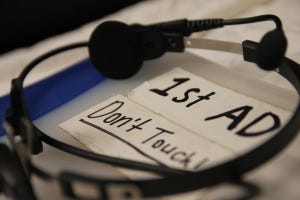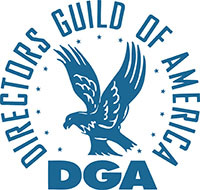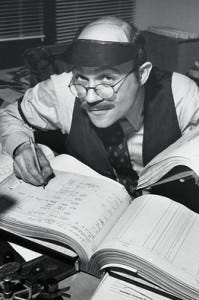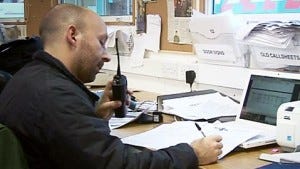How much are Assistant Directors paid?

Following on from last week's look at the number of Assistant Directors (ADs) on UK and Hollywood films, today I'm turning to a more complex topic - how much ADs are paid, and what they think about it.
I interviewed 44 working 1st Assistant Directors in the UK and America, asking them how much they get paid, what they think about their working conditions and what advice they have for the next generation of ADs.
"So, like, are you the director's assistant?"
"First AD" is not a job that's easy to guess just from the name, so I asked all of my interviewees to tell me how they would describe their job to people outside of the industry. Here were some of the most interesting responses...
Like a film conductor or air traffic controller
A Circus ring master
Our job is to take as much burden off the Director as allowed to help create and deliver the Director's vision. The AD schedules and works with Producer to get the project done on time and on budget.
We figure out how to break the script down to its smallest common denominator then arrange things into a schedule that most efficiently gets the film produced saving as much money and maximizing the time allowed.
Directors direct the actors, 1st AD directs the set.
The AD keeps everyone informed regarding what we're doing next for the rest of the day (and beyond).
The First AD deals with the crew directly so the Director can focus on the actors and their performance. By creating a schedule from the script, the First AD has dealt with all the elements from actors availability, to the time of day for sunlight on the set, to give the Director and all the departments the most efficient production.
I am the logistical Sergeant Major that leads the crew each day shot by shot. I break down and schedule all the logistic parts of a film shoot in order to give the Director the creative space she/he needs to tell the story. I factor in all the elements from creative needs, to lighting, to equipment and labor times, to weather. I direct the extras in setting up the background of the scenes. I'm also the chief safety representative on set to make sure no one gets hurt.
Production company's fly me around the world to boss people around.
I'm a hired boss.
Who organises the organisers?
Employment conditions and rates of pay for ADs vary significantly between the UK and the US, largely due to their differing relationships with unions. In the States, unions have a huge amount of power, whereas in the UK, unions are treated more as optional (you could crudely simplify it to 'Enforcers' versus 'Pressure groups').

The US system is managed by the Directors Guild of America (DGA) union which sets minimums (such as rates of pay, preparation time, pension / health plan contributions, etc) and limitations (such as how long ADs can work, travel time, rules around firing ADs, etc).
The DGA rules are pretty detailed - for example, here are the rules relating to what class of ticket the production has to buy when ADs fly (I have simplified it)...
ADs fly at the highest level of Coach.
Unless the flight is over 1,000 miles, in which case it must be Business or First class.
The above rule doesn't apply to the 1,060 mile journey between Los Angeles and Vancouver.
If another DGA-protected crew member of same seniority from the same production is flying at a higher level then the production must match this for all ADs.
Almost all of the American ADs I interviewed said that they exclusively work on union projects. The few who said they did non-union work mentioned that they weren't in LA or New York, implying that non-union work is more common outside of the two movie hubs.

The UK also has unions, but their guidelines seem to be regarded more as a series of recommendations than as fixed requirements. Large employers, such as the BBC, stick to such agreements but it's rare for a small independent feature film to offer union pay or conditions in the UK .
The UK's guidelines have been drafted by BECTU and the Assistant Directors Association (ADA) and cover many of the same areas as the DGA, protecting AD hours, conditions and minimum rates of pay.
However, they are written with a more British tone, e.g. the weary acceptance of undesirable practices: "The AD Branch does not support the use of the “11 day fortnight” though recognises it as a common occurrence".
The word 'must' appears almost three times more frequently in the DGA regulations than in the BECTU rules, despite them being of similar length overall.
How much are Assistant Directors paid?

Rates of pay differ greatly between countries, types of production and whether the production is adhering to union rules. However, to give you a sense of the rates on 'proper' productions, I've done my best to calculate the minimum union rates for 1st ADs and 2nd ADS in the US and the UK. The reason that this takes calculating is that there are so many variables which need to be taken into account when working out the final salary. These include...
The number of hours worked
The type of production (film, TV drama, TV comedy, etc)
The budget of the production (in the States, a separate agreement applies to low budget productions)
The number of days in the working week
Whether the work is prep time or actual shooting
Whether it's a studio or location shoot
How far away from home the production is shooting
Per diems and additional payments for foreign shoots
Finally, the rates regularly change so these rates are the ones which are applicable at the time of writing.
The UK and US systems are quite different so I've done my best to compare the current rates by assuming a five-day shoot week on a feature film shot in a studio, without overtime or fringe contributions and everything has been converted into British Pounds.
At the lowest level, UK Assistant Director minimums are slightly higher than the States (1st ADs are on £1,350 in the UK and £1,149 in the States, and 2nd ADs are on £1,000 in the UK and £771 in the US). However, once we pass three-quarter of a million pound budgets, the American 1st ADs are paid more. On a £1 million feature film, the UK 1st ADs minimums are £1,500 per week, whereas in America it's £1,742. UK 2nd ADs are still paid more than their American peers (£1,250 versus £1,167) but that advantage disappears as budgets rise.
On feature films budgeted at £10 million, UK 1st ADs minimums are under half of their American equivalents at £2,000 compared to £4,128.

These are based on five-day weeks, with DGA rates for the sixth day being 150% of a normal day and a seventh day is 200% the normal day rate.
Overtime can add up quickly. Under the DGA rules, a 1st AD receives an additional half day's pay if they work between 14 and 16 hours, an additional full day's pay if they work between 14 and 20 hours, and after 20 hours they receive an additional day's pay for every four hours they work (or fraction thereof). While the idea of earning triple pay in a day may sound appealing, consider just how hard and demanding an AD's job is. Also, they are a key part of keeping the cast and crew safe, so it's fair to assume that a set run by an AD who's been working for 22 hours is a much more dangerous place.
Are Assistant Directors paid fairly?
Given the figures above, it can't be much of a surprise to hear that one of the major complaints of the UK ADs is the money they were offered, whereas US ADs seem to regard themselves as well paid.

One US AD summed up the American consensus by saying "We are paid well and we earn it". Some noted that non-union productions invariably pay less, with a few people noting that "some non union rates are awful". A typical comment was "The DGA has great contracts. It's only rough when a young AD is working their way up thru indie films".

By contrast, the UK ADs complained loudly about wages. Here's some UK ADs' points of view...
"The rates vary on every production. There is no 'industry standard' as such. As a 2nd I have been offered (and turned down) an offer of £400 per week for a 6 day week and 12 hour shoot days. This is unacceptable".
"ADs are not paid appropriately. They are paid for the shoot day e.g., calltime 0700 wrap time 1900. 2nd ADs will be in the office from 0600 at the latest (not getting paid) and leave the office well after 2000 (again no overtime) calculate that for a six-day week that's a minimum of 12 hours overtime - an entire shoot day. Plus, we work on Sundays. There will always be an amendment or a cast problem or somebody hasn't received something and it is left to the 2nd to sort out".
"We are responsible for a lot on a production and the rates of pay do not reflect that. There needs to be a big change."
In January 2014, I looked at a year's worth of jobs posted on the UK indie film community Shooting People. Of the 2,531 jobs posted, 95 were for 1st ADs. Only 15% of those 1st AD job adverts were for paid work, and the average rate offered among the paid roles was just £95 per day.
A public service message from your friendly AD department

I gave all of my interviewees the chance to speak to the industry from an AD's perspective. Some choose to explain their needs, others to make polite request while I think others just needed to vent. So, below, I present some statements that ADs would like to convey to everyone else...
Number of setups per day - please get real.
Humility across the board helps everyone.
Lack of planning by directors makes it very difficult to do our job.
Number one problem is mismanaged expectations of what is possible on a project. Whether it is how much can be shot within a day, how easily it will be to get a specific location, how safely a stunt can be executed, or anything.
Some producers (even though they have an adequate budget to work with) behave as if every dollar they spend is coming directly from their baby's mouth. Not all producers, but there are definitely some out there. They seem to believe that their value is mostly based on how under-budget they can be at the end of the job. It's cold, unnecessary, and insulting. And it makes the job harder.
There is a systemic gender bias in the film and TV. It is still very much an old boys club.
Please give us enough prep time to be organized
AD's might seem expensive to a lower budget, but a good AD team can be the difference between having a completed film and having a bunch of dailies that never get cut into anything.
I think that the DGA pension plan is unfair to AD's, the job is just too hard to do for decades.
Let's change the number of hours per day (producer or directors who plan a 14 hour or above day should be fired) to ten hour days before more people die from lack of sleep.
The hours are too damn long for safety.
The cost of entry is too low. God bless you if you want to make your passion project, I just want to live comfortably and spend time with my family. Work should not intrude.
Too many hours, not enough concern for people's safety and well being when they are driving home from a long day, not enough thanks, not enough thank you's to the Crew.
If I hadn't worked an 18 hour day yesterday, I could go bananas here but I just don't have the energy
1st ADS are generally undervalued, without ADs things just wouldn't run as smoothly, but because they don't have a 'technical skill' we are continually underpaid. A camera op can be on £200/day more??
That ADs need to be treated more equally and fairly. It is bizarre to think that the people who ensure the running of a smooth day, the people who start work earliest and finish work the latest are still paid less than their counterparts. Why?! We are tired, we are overworked and yet we still do our best every day to make sure that everyone is happy and that nothing falls apart.
Main problem recently is lack of prep time and locked scripts to work with. Always end up costing company money in long term. Also need more people with real on set experience at management level.
Just pay the base rates, don't overload runners with ridiculous hours and just because your CV doesn't say you have firsted a type of production doesn’t mean you can't. Running a production should be the same no matter the type.
How to get ahead in the Assistant Directors' department

Finally, I asked my interviewees what words of advice they had for new entrants who want to get ahead in the AD's department. Many echoed the same thoughts so below are just a few of the most common...
Keep a smile on your face, don't scream or yell at people. Gain respect from the crew first. Say hello and good morning before you ask or tell a crew member anything.
Get on as many sets as you can, observe as much as you can, and pay attention to how everything was organized. Also, when ever possible, read and break down as many scripts as you can, better for pay, but the more you practice breaking down scripts and organizing schedules, the better you get.
Be humble. You can't control everything, though you are going to try. Mistake will happen.
Delegate to your team.
Say when you can't do something.
Build good communication skills.
Work as a set PA for a large number of First AD's on a variety of shows to get experience in all genres and sizes of productions. Also this will give a large network of working people so when the jump is made to the AD world there is credibility and a large network to rely on for work.
Start by working as a production assistant, trying all the positions within the AD department and pay close attention to how the 1st, 2nd and 2nd 2nd AD work
Pay attention - don't quit - work for free and low budget to learn as much as you can - learn to survive on very little sleep
Stay in physical shape
Never ever be late.
Always have a pen to write things down.
Read the callsheet for the day so you know what is going on.
Do everything asked of you and have a great attitude about it, even when tired or it's not glamorous. Get used to it, if you want to work as an AD you can make a good living making films, but you are one of the first in and last out, and you get hardly any recognition for it.
Keep your eyes and ears open, mouth shut and anticipate what the director wants before he/she knows she/he needs it.
Pay attention, cultivate relationships with the crew as well as actors and directors. Ask questions; the more you know about other departments, the better.
Learn how to glean information from a call sheet, keep yourself informed, learn how to anticipate
Good waterproof warm clothing.
Keep calm and smile!
Be attentive, try and work out exactly what other departments do so that you understand their needs and are able to help them out.
Try to have thick skin as many people will say things they don't mean during times of stress.
There are too many 'shouters' and pricks in charge. Don't take anything personally. Wear a professional shell at all times, even when those around you don't.
Learn everyone's name. If you get told a piece of information, ask yourself two questions: What do I do with this information, and who else needs to know it?
Always answer your radio
Be prepared to work with some proper self important characters who think they are the film.
Enjoy it - it's the best job in the world.
Notes

I found my interviewees via a few different sources, most principally the Assistant Directors Association (ADA) in the UK and Variety 411 in the States. I checked the credits of each person via IMDb to ensure I was speaking with experienced, working Assistant Directors.
Thank you to all the ADs who took the time to be interviewed.


